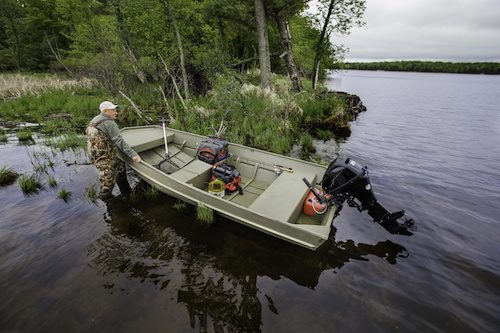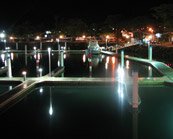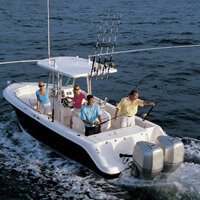Skiff boats are some of the most popular boats around, and once you get to know how pleasant life can be in a skiff, it’s no wonder why. The term “skiff” can be used to describe many different types of small boats. In fact, the term is often used as a catch-all for any type of boat that has a few basic traits.
Skiff Boat Common Traits
- Small
- Open
- Simple
- No complex electrical or plumbing systems
- Made up of a hull, outboard engine, some seats, and a few fishing rod holders
Explore Skiff Boats & Aluminum Fishing Boats
Skiff Boat Advantages
The beauty of owning a skiff lays in its simplicity.
Low Maintenance
There’s very little to worry about beyond basic outboard motor maintenance and rinsing the boat down at the end of the day. Since there aren’t additional systems or accessories there’s very little that can break or fail, so they’re also extremely reliable and cost little to keep in tip-top shape.
Easy to Handle
A skiff’s small size means it’s easy to handle on the water, easy to tow with a light-duty tow vehicle, and—critical for many people—it’s also easy to afford in the first place.
Ownership is Simplified
Many of the issues that can arise with larger vessels aren’t problems, with a skiff. Consider boat storage, for example. With a skiff it’s usually as simply and cost-free as backing the trailer into your driveway or garage. Or think about winterizing a boat with complex fuel and plumbing systems, versus one without them. In a nutshell, the basic nature of a skiff means that virtually everything related to boat ownership is simplified.
Potential Drawbacks
We all have to realize that there’s no such thing as a “perfect” boat, and that all different types and varieties have their own unique upsides and downsides. And if you’re considering buying a skiff, you should also know the downsides to owning one.
Small Size
The most obvious again result from a skiff’s inherent small size and simplicity. Most skiffs will be limiting in how many people and how much gear you can bring aboard, and will not be suitable for large, open bodies of water that are subject to rough seas. You can’t expect a lot of creature-comforts like enclosed head compartments or reclining loungers, and the seats may even be as basic as flat benches going from side to side.
Open to the Elements
The open nature of these boats also means that you’ll usually be exposed to the sun and weather. As a result you’ll want to pick your boating days according to the weather, and families with small children may want to keep their trips short. On some skiffs, you may be able to add a small Bimini-style collapsible sunshade to at least get some basic protection.
Steering System Challenges
Another factor to consider is the steering system. Since most skiffs don’t have the forward helms or dedicated steering stations you’d find on other types of larger vessels, like center console boats or bowriders, many are controlled with tiller-steer outboards. Tiller steering is very responsive and with some practice anyone can get used to handling a boat with a tiller. But it does take some getting used to, because the boat reacts inversely to your hand motions. When you push the tiller to the right the boat turns left, and vice-versa. Naturally, this can be a bit confusing to beginners and operating a tiller-steered boat will require a few outings before you become accustomed to it.
Is a Skiff Boat Right for You?
So, would a skiff be the right boat type for your lifestyle? That’s a question that can only be answered by you, personally. But if you see beauty in simplicity, you want a basic boat that won’t break the bank, and the idea of low maintenance and expenses strikes you as appealing, you might find yourself backing a brand new skiff into your driveway one day soon.
Read Next: What is a Jon Boat?
You Might Also Like:




